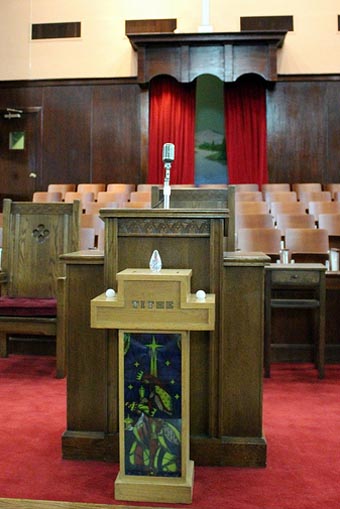ORGANIC FRUIT
Three Things Every Christian Should Know
Who Leads the Church
By Stephanie Ismer


The Series
Abraham's FaithHow Sanctification Works
Who Leads the Church

When the early church was being established, there were elders, shepherds and overseers (Acts 15:23) who helped make decisions for the church, plus other offices such as prophets and teachers and deacons (Ephesians 4:11; 1 Timothy 3:8-13). There were those who ministered in other ways as well, giving or helping as they had a gift and the heart to do so, or evangelizing (1 Corinthians 12). And there was a variety of gifts, but the same Spirit (1 Corinthians 12:4). Some gifts were higher than others (1 Corinthians 12:31). Prophecy and apostleship were among the highest gifts (1 Corinthians 12:28). All of these "parts" of the early church functioned together, with Christ as its head (Ephesians 5:23).
In the early church, the Spirit was very active. Throughout the book of Acts, we see amazing healings and miracles occurring, but we also see elders gathering to pray and consider decisions, such as where to send an apostle next (Acts 17:14; Acts 15:6). The Spirit was clearly leading the church through these elders. There is one feature of our modern church, however, that is absent: the pastor.
Some people point to Paul's relationship with Timothy as proof that there was precedent even then for a "head pastor" to be in sole leadership over each particular church, but close examination of Paul's letters to Timothy show no such thing. What we do see is one man encouraging another to preach the word faithfully and fulfill his ministry. And the letters tell us Timothy had the gift of evangelism (2 Timothy 4:2, 5). Paul also outlines the duties of overseers and deacons to Timothy, but doesn't call him either one (1 Timothy 3:1-13). Paul tells Timothy to be an example to the other believers, to read the Scripture, to exhort and teach, and he says "do not neglect the gift you have, which was given you by prophecy when the council of elders laid their hands on you" (1 Timothy 4:11-14). Timothy was clearly a powerful figure in the church, perhaps an apostle or evangelist following in Paul's footsteps. But, does this mean Timothy was a head pastor, like the ones we see in churches today? Yes and no.
Timothy was an example of what man's leadership in the church should look like. But he was not the leader. Christ is the leader of any body of believers (Ephesians 5:23). Even Peter, who has been called "the first Pope" by the Catholic church, clearly refers to himself as "a fellow elder" that is helping to "shepherd the flock of God" (1 Peter 5:1-2).
Leadership in the church was meant to be dynamic, following the leading of the Spirit. Men leading the church were to think of their task as that of a steward watching over his Master's property (Titus 1:7). Of religious leaders, Jesus said: "And call no man your father on earth, for you have one Father, who is in heaven. Neither be called instructors, for you have one instructor, the Christ. The greatest among you shall be your servant" (Matthew 23:9-11).
Image Credit: Wally Gobetz; "Atlanta - MLK Historic Site: Ebenezer Baptist Church"; Creative Commons
Tags: Biblical-Truth | Church-Issues | Ministry-Church | Theological-Beliefs
comments powered by Disqus
Published 12-22-15

